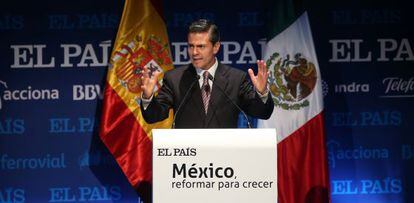Peña Nieto: “Mexico has decided to change things that did not let it grow”
Mexican president outlines reforms he has introduced at Madrid event organized by EL PAÍS

“Mexico is a country in transformation. It has decided to change everything that was stopping it from growing.” Those were the words of President Enrique Peña Nieto at a lecture in Madrid on Monday titled “Mexico: reform for growth”, which was organized by EL PAÍS.
During his talk, the Mexican leader, who has been in office since December 2012, defended his program of reforms and said that their aim is to produce a more competitive, transparent and efficient economy.
“Many of the reforms had been postponed for decades, but we have decided to touch on issues that seemed untouchable until now. This is the hallmark of a mature democracy,” said Peña Nieto at the event, which was sponsored by the Spanish companies Acciona, BBVA, Ferrovial, Iberdrola, Indra and Telefónica.
We are touching on issues for reform that seemed untouchable until now” Enrique Peña Nieto
Peña Nieto, of the Revolutionary Institutional Party (PRI), reviewed his 18 months in government with particular focus on his reform of the energy sector. While this is a very controversial issue back home – where many Mexicans feel that their national resource, oil, is being sold out to foreign interests – the president said that opening the economy up to foreign investment will “benefit all Mexicans” and transform the struggling state oil company, Pemex, “from a state industry to a productive state industry.”
The Mexican leader also discussed labor and telecommunications reform, as well as new financial regulations, and revealed that the Pact for Mexico, a cross-party agreement to modernize the country, found inspiration in Spain’s own transitional period in the 1970s and the Pacts of La Moncloa, a consensus among Spain’s main parties to introduce democracy to the country.
“It inspired us and served as a reference point when we needed to draft a common agenda for all the forces in politics,” said Peña Nieto.
Peña Nieto admitted that the crime problems facing the country have not been solved yet
His address was followed by a panel discussion between the Mexican president and Juan Luis Cebrián, CEO of PRISA, the parent company of EL PAÍS.
Cebrián told Peña Nieto that “just as the Pacts for Mexico found inspiration in the Pacts of La Moncloa,” so should the Mexican president recommend that Spanish politicians look to the Pacts for Mexico in order to find common ground.
Peña Nieto took this opportunity to underscore his vision of Mexico as a profoundly democratic country with “healthy public finances, a flexible exchange rate and a solid banking system,” which is open to trade and foreign investment. The president added that he hopes to attract more money to the country by introducing greater competition and legal security.
“We are committed to the rule of law,” he said.
Regional relations with Latin America are also a key element on Mexico’s agenda, said Peña Nieto.
“Mexico has tried to intensify relations with all countries in Central America, the Caribbean and all of South America,” he said. “It is undeniable that Mexico has a historic relationship of fraternity and trade relations with the United States and Canada. But it cannot forget the connection points with its roots in Latin America and the Caribbean.”
As for one of Mexico’s greatest challenges, security, Peña Nieto admitted that the problem has not been solved yet.
“Unfortunately, in recent years Mexico has been very stigmatized by security concerns,” he said, arguing that violence has been reduced, especially in the high-conflict areas.










































